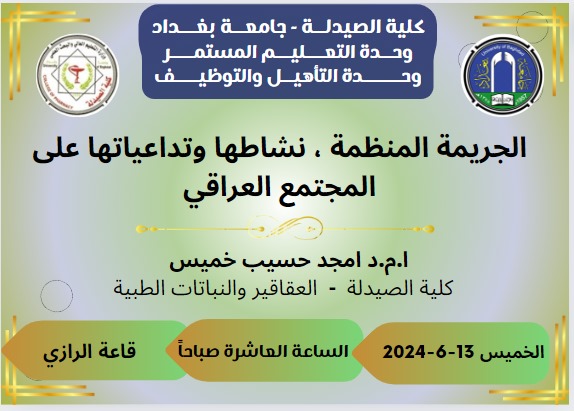Under the supervision of the Dean of the College of Pharmacy, Associate Professor Dr. Sarmed H. Kathum Alkhateeb, the Continuing Education Unit at the University of Baghdad/College of Pharmacy, held an in-person workshop entitled “Organized Crime: Its Activity and Consequences on the Iraqi Society,” delivered by Assistant Professor/Dr. Amjad Haseeb, a faculty member at the Pharmacognosy and Medicinal Plant Department.The workshop aimed to identify the concept of organized crime and its seriousness and consequences for society. The workshop included several topics, including the linguistic definition of organized crime: the offense is committed by a multifaceted criminal group consisting of one or more persons present for a period of time who, together, carry out an orchestrated act aimed at committing one or more serious crimes defined in the convention against organized crime and promulgated by the general assembly of the United Nations. They are committed to their activity thoroughly and thoughtfully, and they make a lot of money behind it. It is difficult to control because it is clandestine and relies on the factor of trust within the organization. Strict laws impose punishment for those who attempt to break out of it and divulge its secrets. They are not limited to a single type of crime and can commit transnational crimes, including money laundering, serial crimes, smuggling of women, children, human organs, drugs, oil derivatives, smuggling of weapons, nuclear materials, etc. The dangers and repercussions on society have also been addressed, such as economic effects and risks to security, social unrest and corrupt employees, corruption through bribery, corruption of values, and social and family relations. The workshop concluded that the most important suggestions for reducing organized crime are: canceling the embroidery in all its forms and types; establishing clear and strict laws for institutional action; and cutting off financial and administrative corruption, in addition to increasing people’s cultural, social, and security awareness; and re-clarifying and understanding current terminology such as freedom, democracy, power, and law.



